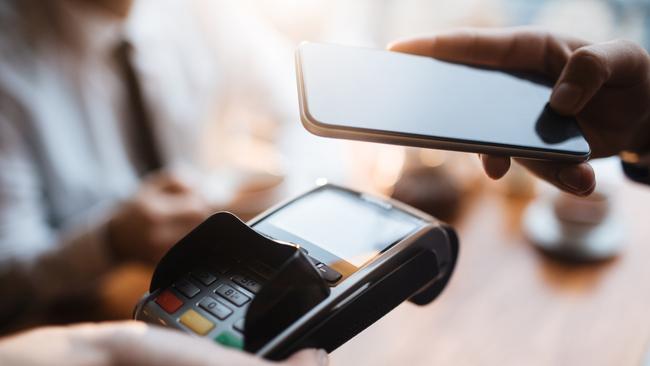The common smartphone app that’s ripping you off
Barefoot Investor Scott Pape says consumers are being overcharged by technology when they pay for things.
Imagine if the maps app on your phone was dodgy.
Without you knowing it, Google directed you to routes with toll roads … because they got a kickback from the toll road company.
Outrageous, right?!
Well, according to Small Business Ombudsman Bruce Billson, that’s what’s happening … with another app on your phone.
Can you guess which app is screwing you?
(Drum roll.)
That’s right, it’s your bank app. (It’s always the bloody banks.)
Here’s the sting:
Since we all became germophobes, tap-and-go payments have exploded. In fact we Aussies are now the biggest users of contactless payments in the world, according to banking research firm RFI Global.
Yet what most people don’t know is that, when they tap, their bank generally defaults that payment through Visa or MasterCard, who pays them a fee – instead of defaulting that payment through the much cheaper bank-owned EFTPOS.
Talk about a rort!
Getting slugged a surcharge of up to 2 per cent on every transaction could be costing you upwards of two hundred clams a year (collectively a $1 billion-a-year rort, according to the Ombudsman).
So let me suggest two quick ways to make it much less likely you’ll be charged.

First, change your default payment on your phone.
On an iPhone, open ‘Settings’, go to ‘Wallet & Apple Pay’, then tap your debit card. Then look for ‘Payment Option’. It will generally have ‘MasterCard’ or ‘Visa’ preselected, but instead you should select ‘eftpos SAV’. (Not all cards allow you to do this, and if you’re on an android you’ll need to check with your bank, because it’s a bit tricker apparently.)
Second, pull out your physical card.
I know it’s annoying, but if you swipe and insert your card you can choose ‘cheque’ or ‘savings’ and it’ll go through the EFTPOS system, which at the bigger retailers means you’ll be less likely to be charged.
Here’s the problem though.
Let’s say you’re at my local fish’n’chip joint, which has a sign on the till that reads:
“Surcharge 1.5%.”
The 16-year-old goth with the nose ring and bad attitude doesn’t understand the intricacies of banking payment systems, nor the fact that you’ve chosen EFTPOS, which will result in her employer being charged less in fees. She’s going to hit you with the fee, because, well, just because.
So here’s what really needs to be done:
The Government needs to ban surcharges … the same way they have in the US and the UK.
That’s a rolled-gold vote winner a year out from an election, right?
(Hello, Minister for Financial Services Stephen Jones and Shadow Minister Luke Howarth!)
Tread Your Own Path!
How to Earn 7.35% on Your Savings
Hi Scott,
I’m not your typical Barefoot reader. I’m a senior executive who reads the Australian Financial Review (AFR) and has a digital subscription to the Wall Street Journal. In other words, I’m well read! I have been lately interested in private credit, which has exploded in popularity since the GFC, after banks stopped lending to businesses. Specifically, I read about a new product by fund manager Pengana (and Mercer) called TermPlus which is currently paying 7.35 per cent per annum. What are your thoughts on this?
Raymond
Hey Ray!
Well, you do sound like a very smart sausage.
Funnily enough, investing in private credit is a lot like buying snags: in both cases the key question you want to know is “what went into the sausage?”.
Was it pork? Chihuahua? Toenail clippings?
Similarly, I’d want to know who these fund managers loaned the money to, and, more importantly, how these borrowers are coping after 13 consecutive interest rate rises.
To scratch my itch, I went digging through their product disclosure statement (PDS), but alas it was like reading a Dr Suess book – completely nonsensical. The only thing that stood out was the fees, which are outrageously high – 1.94 per cent per annum, plus an additional 1.01 per cent performance fee. Talk about green eggs and ham!

Look, staying the hell away from whatever Wall Street is selling has served me well in my career – and private credit is being sold really hard now. It’s being touted as a way to earn much higher returns than a bank term deposit, without the risk of shares. If only it were that simple.
It’s not that simple.
The managers are making a fortune in fees, to be sure, but it’s the depositors who are ultimately taking the risks. And remember these funds are not guaranteed by the Australian government, the way that traditional bank term deposits are up to $250,000.
Truth be told, I’m very conservative, but that’s because I still have PTSD from dealing with heartbroken retirees who were sold (supposedly low-risk) investments that were paying higher returns than bank deposits, and who ended up having their money frozen or lost.
My view?
A good term deposit will generate you roughly 5.25 per cent per annum, guaranteed by the government. That seems like a decent place to park your short-term cash (money you don’t need in the next five years should be invested in low-cost index funds).
Phil, I know you’re well-read, so perhaps I could point you to my son’s favourite nursery rhyme book and his favourite ditty, which makes a compelling case for the risk of private credit lending that their PDS doesn’t: “Ten fat sausages sizzling in a pan, one went ‘pop’ and another went … ‘BANG!’”.
Barefoot Confession
Hi Scott,
I just have to get this off my chest. For the last five years I worked in a job where I only did about one hour’s worth of work each week (there was a six-week period each year where it was quite busy and I would do maybe two-to-four hours a day). The rest of the time I would browse the internet, go on 60-90 minute walks while listening to podcasts, prepare food in a makeshift mini kitchen I had set up, watch TV series and movies, play retro video games online, just whatever I wanted that wouldn’t look too obvious that I wasn’t doing anything – although I’m sure people knew. I even negotiated a pay rise for myself while doing all of this – from $70k to $78k. I left that job with an absolutely glowing reference from my boss that helped me get my current job, where I do actually work most of the day.
Cindy

Hi Cindy,
I could kind of see how this could happen if you were working from home.
(Employers think they can track workers via apps like Microsoft teams and Gmail that mark you as ‘away’ if your mouse doesn’t move for a period of time. What they don’t know is that sneaky employees are buying an undetectable “mouse jiggler” on Amazon for $15, which has 4,555 glowing reviews on Amazon).
Yet you did this from the office!?
Hopefully they replaced you with a pot plant. And if I were the owner of that business, I would have placed your old boss – who gave you a pay rise and a glowing reference – on permanent gardening leave!
I’m Off the Booze
Hi Scott,
I’ve been meaning to write to you for some time now. I work as a police officer and, as you could imagine, I have developed what might be called a bit of a habit of drinking. I never thought I had much of a problem, yet time went on. I read your response to a lady who wrote in asking about giving up drinking as a New Year’s resolution. Your reply mentioned a podcast by Dr Andrew Huberman. I watched the YouTube video and it made me open my eyes to how poisonous alcohol is and how little you need to drink to be considered chronic. I loved your reasons as well. I have not touched a drop since. I’ve found I’m sleeping better, and am calmer and less stressed as a result. I want to thank you because I don’t think I would have ever stopped if it wasn’t for you (and Dr Huberman). My life is so much better and my kids now have a better role model.
All the best, Nigel
Hi Nigel
If I had a dollar for every person who wrote to me saying they’d given up the grog after reading that article and listening to the podcast, I’d be able to shout Barnaby Joyce a night out on the turps. You got this!
DISCLAIMER: Information and opinions provided in this column are general in nature and have been prepared for educational purposes only. Always seek personal financial advice tailored to your specific needs before making financial and investment decisions.



To join the conversation, please log in. Don't have an account? Register
Join the conversation, you are commenting as Logout